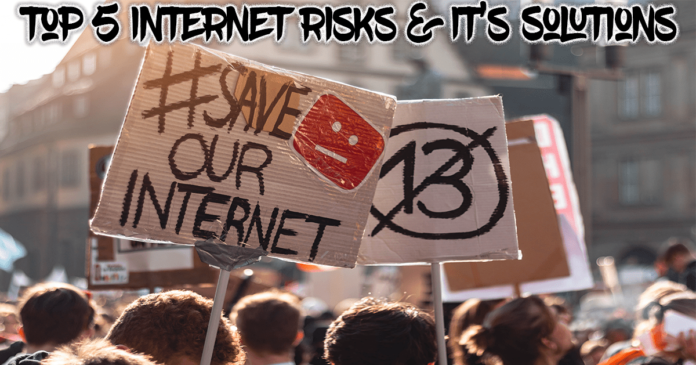
Table of Contents
How to protect my child on the internet is the first question as a parent for kids. keeping kids safe on the internet is very important these days compared to those brought up in other generations.
Today’s children have more access to the internet and information. As everything seems to shift to online platforms: remote learning, work, shopping, business, and other useful resources, it is impossible to separate the children from this wealth of information.

But there is always a safety challenge of living in this interconnected world. More free time leads to more screen time and consequently, higher exposure to internet risks.
According to the statistics released by NCES, 94% of children aged 3-18 years can access the internet from home. In this age of multiple smart gadgets and internet needs, you cannot isolate your children from the internet 2021. So, what can you do to protect them?
In this article, I have compiled 5 easy tips which if implemented, can help you protect your children on the internet in 2021. But before these tips, you need to be aware of the current online dangers that your children are exposed to.
Hackers see kids as easy target and are keen on devising attack techniques to lure them.
Here’s a quick summary of the risks and the respective measures covered in this post.
How to protect my child on the internet?
- Keep kids internet devices in a common area of the house
- Have consistent online safety conversations with your children
- Protect your kid’s internet devices using a VPN
- Use parental controls and blocks
- Teach your children the basics of strong passwords
Keeping kids safe on the internet?
- Cyberbullying
- Exposure of personal information
- Online predators
- Online scams
- Access to inappropriate content
Now, let’s have a detailed look at these insights.
5 tips that how to protect my child on the internet.
Following are some tips that can help you that how to protect my children online on the internet in 2021.
Keep kids internet devices in a common area of the house
- Placing your children’s internet devices in a common area of the house is an ideal way to prevent them from accessing inappropriate content without your knowledge.
- By knowing that you are monitoring them, children may shy away from accessing inappropriate content. In a case where they stumble into it by accident, then you will be right there to advise them on the appropriate move and probably block such sites.
Have consistent online safety conversations with your children
- Make a habit of having open and candid conversations with your children. Talking to them will help you to know how your children are feeling from internet use.
- Gauge them to know if there are any emerging issues such as bullying, harassment, and any other thing that might be making them uncomfortable.
- Let your child know that you are there for them and that with you, they can discuss anything that upsets them on the internet.
Protect your kid’s internet devices using a VPN
- Installing and teaching your children how to use a VPN when connecting to public networks is another way of keeping your children safe online.
- Through traffic tunneling and data encryption, Virtual Private Networks will hide your children from online predators and spies who are hunting for their next victims on unsecured networks.
Use parental controls and blocks
- Use parental controls and blocks to set the appropriate boundaries for your children. Discuss why these controls are useful.
- Block sites with inappropriate content to avoid instances of your children stumbling onto them without your knowledge.
- It’s also prudent to schedule screen time limits so that your children have sufficient time for other activities like off-screen games and sleep.
Teach your children the basics of strong passwords
- Lastly, teach your child how to secure their accounts with strong passwords. That they should not use the same password on multiple platforms, use easy-to-guess passwords, or write them down.
- A strong password should be impossible for an attacker to guess but easy for the child to remember.
Keeping kids safe on the internet, these are the risks
Here are the 5 risks from which you should keep kids safe on the internet, following are;
Cyberbullying
- Cyberbullying is the same as regular harassment, the only difference is that it takes place online. Cyberbullies attack their victims by sending hurtful messages or comments. This can happen on social media or any other online platform.
- Research indicates that the more time a person spends online, the higher the exposure to cyberbullying. As a parent, you may not know the exact amount of time that your child spends scrolling through social media platforms.
- According to the research, Instagram, a leading social media site is a high-risk platform for cyberbullying. Unfortunately, many 14-18-year-olds hold an account on this platform.
- Cyberbullying can be an ongoing process and the repercussions may come back to haunt an affected child later in life. Blocking the perpetrators can be a short-term solution although many of them end up hunting for their victims on alternative platforms.
Exposure of personal information
- Oblivious of any social boundaries, children may expose too much information on various online platforms. This may include personal identification information such as phone numbers, home addresses, live photos, and videos.
- Leaving this identifiable information makes it easy for online snoopers and other criminals to track your family or the child down. In some cases, children may become victims of online harassment such as body shamming from the photos shared online.
Online predators
- Online predators are grownups often masquerading as children to stalk our young ones on the internet. The main objective is to exploit their innocence either by making sexual advances or luring them into physical meeting arrangements.
- Online predators use gaming platforms, social media, and other interaction sites to lay their trap on unsuspecting children.
Online scams
- Just like adults, children are prime targets of online scams such as get-rich-quick schemes and many other scams that promise to be of value. To lure them into clicking, they may suggest huge winnings or be crafted to appear like they are from a legit source.
- Attackers can spam children’s websites with fake rewards like lump sum ‘guaranteed’ payouts, unlimited access to premium versions of online games, and other too-good-to-be-true scams.
- Unknowingly, your child may fall for these online scams and be lured into exchanging private details such as credit card information.
Access to inappropriate content
- In their wit, children may attempt to search for inappropriate content or land onto it by accident. Either way, this may be content related to sexuality, violence, drug abuse, and other immoralities.
- Accessing such content can be addictive and before you know it, your child could be attracted to or engaged in immoralities at a tender age.
Bottom-line
Children are some of the most active internet users. They can access so much within such a short time; some of which might expose them to online threats but as a parent, I should know how to protect my child on the internet from these threats.
By consistently applying the above tips, you and your child can stay ahead of online criminals and the other online risks.
Here are five pro tips that assure the protection of children on the internet.
1. Keep kids internet devices in a common area of the house.
2. Have consistent online safety conversations with your children
3. Protect your kid’s internet devices using a VPN
4. Use parental controls and blocks
5. Teach your children the basics of strong passwords
1. Cyberbullying
2. Exposure of personal information
3. Online predators
4. Online scams
5. Access to inappropriate content












Technology is the best thing we have today. We have a smartphone in our pocket, and we can connect to almost anybody instantly.
Yes, you are Right Sir.
But it can be worse though so we have to make ourselves ready for the worst-case scenario also, it’s just part of the game.